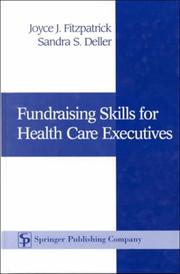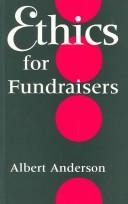| Listing 1 - 3 of 3 |
Sort by
|
Book
ISBN: 1447325036 1447325311 144732501X 1447325001 1447325028 Year: 2017 Publisher: Bristol : Policy Press,
Abstract | Keywords | Export | Availability | Bookmark
 Loading...
Loading...Choose an application
- Reference Manager
- EndNote
- RefWorks (Direct export to RefWorks)
This is the first empirically-grounded and theorised account of the identity, characteristics and motivation of fundraisers in the UK. Based on original data collected during a three-year study of over 1,200 fundraisers, the book argues that it is not possible to understand charitable giving without accounting for the role of fundraising.
Fund raising. --- Charities. --- Charities --- Fund raising --- Great Britain. --- Alms and almsgiving --- Benevolent institutions --- Charitable institutions --- Endowed charities --- Institutions, Charitable and philanthropic --- Philanthropy --- Poor relief --- Private nonprofit social work --- Relief (Aid) --- Social welfare --- Associations, institutions, etc. --- Poor --- Social service --- Endowments --- Fundraising --- Money raising --- Prospecting (Fund raising) --- Fund raisers (Persons) --- Societies, etc. --- Services for --- Finance --- Capitalists and financiers --- Fundraisers (Persons) --- Prospectors (Fund raising)

ISBN: 0826113672 9786611806231 1281806234 0826116647 9780826116642 9780826113672 Year: 2000 Publisher: New York Springer Pub.
Abstract | Keywords | Export | Availability | Bookmark
 Loading...
Loading...Choose an application
- Reference Manager
- EndNote
- RefWorks (Direct export to RefWorks)
No one prepares the new dean or health care executive for the fundraising aspect of their profession. Rather, it is one of the skills that is expected but not explicitly taught. Here, a former Dean and a Director of Major Gifts for a renowned nursing institution, with a combined 50 years in the profession, present an explicit, hands-on guide to successful fundraising among individuals, foundations, and corporations. From the basic principles of development to the specifics of tax regulations and the sometimes delicate matter of stewardship, this book articulates strategies for success.
Nursing schools. --- Schools, Health Occupations --- Economics --- Academic Medical Centers --- Health Care Economics and Organizations --- Schools --- Health Facilities --- Education --- Health Care --- Health Care Facilities, Manpower, and Services --- Anthropology, Education, Sociology and Social Phenomena --- Financial Management --- Fund Raising --- Schools, Nursing --- Schools, Medical --- Health & Biological Sciences --- Nursing --- Fund raisers (Persons) --- Fund raising. --- Health facilities --- Medical education --- Nursing schools --- Endowments. --- Medical personnel --- Fundraising --- Money raising --- Prospecting (Fund raising) --- Fundraisers (Persons) --- Prospectors (Fund raising) --- Professional education --- Charities, Medical --- Social service --- Capitalists and financiers --- Fund raising --- Finance

ISBN: 0585179190 9780585179193 0253330289 0253210526 9780253330284 9780253210524 Year: 1996 Publisher: Bloomington, Ind. Indiana University Press
Abstract | Keywords | Export | Availability | Bookmark
 Loading...
Loading...Choose an application
- Reference Manager
- EndNote
- RefWorks (Direct export to RefWorks)
"Invoking a variety of classical and contemporary models, Albert Anderson examines what it means to think and act ethically. Proceeding from the views of Immanuel Kant and John Stuart Mill - who created perhaps the two most influential, albeit competing, ethical frameworks - Anderson poses the choice between what we understand to be our moral duty and what will likely result in the greatest good for the majority. He applies these notions to a wide range of situations familiar to nonprofit development officers, volunteers, and organizations. His goal is to help readers rethink decision-making and the principles that guide their decisions. To clarify and test these principles, Anderson presents a hypothetical case and concludes with a program for developing and refining (through experience) a code of ethics for the organization."--Jacket.
Fund raising --- Fund raisers (Persons) --- Nonprofit organizations --- Charities --- Alms and almsgiving --- Benevolent institutions --- Charitable institutions --- Endowed charities --- Institutions, Charitable and philanthropic --- Philanthropy --- Poor relief --- Private nonprofit social work --- Relief (Aid) --- Social welfare --- Associations, institutions, etc. --- Poor --- Social service --- Endowments --- Fundraisers (Persons) --- Prospectors (Fund raising) --- Capitalists and financiers --- Fundraising --- Money raising --- Prospecting (Fund raising) --- Moral and ethical aspects. --- Professional ethics. --- Finance. --- Societies, etc. --- Services for --- Finance
| Listing 1 - 3 of 3 |
Sort by
|

 Search
Search Feedback
Feedback About UniCat
About UniCat  Help
Help News
News